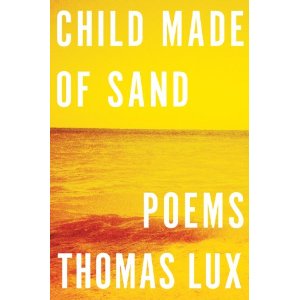As I get older, I find myself thinking more about my childhood than I did in my 30s and 40s. Perhaps I was too busy then, too caught up in career and family and life. As I get older, though, I find myself thinking about my grandmothers, my childhood friends, my extended family, and scenes from childhood I hadn’t thought about in years.
(I wonder what happened to Phyllis, the girl in fourth grade who whacked me in the face with her purse for no reason, causing my nose to bleed and prompting the three prettiest girls in the class—Priscilla, Bobbie Jean and Sherry—to rush me off to the teacher. Some nosebleeds were worth the mess.)
Thomas Lux teaches at Georgia Institute of Technology, is a former Guggenheim fellow and the recipient of three National Endowment for the Arts grant, and has published twelve books of poetry. I read his new collection of poems, Child Made of Sand, and I found I’m not alone. Many of the poems are about childhood, family, and relationships buried in the past, and how they collectively become memory. A fishing trip, the nicknames of boyhood friends, the farmhand working on the family farm, what the school cafeteria workers were called, a flower found in the forest, how dead horses were buried—all have become poems, powerful poems, poems that stimulate, and perhaps shape, the poet’s memory, and our own.

He got that way, said the man who hired him,
by hunching over rows
to do what I hired him to do: hunch over rows,
twist a stem – beans, squash – and snap it off.
His broken back
bends downward
and to the left. He ate
with us at the picnic table,
leaning on his higher elbow,
after the hay was in,
during which he was little
help: he could life a bale but not heave it above his hump
onto the flatbed truck.
In a good year, hay’s second mowing
is the season’s last, so
he’d stay until all the eating was done
and then walk home,
the back way, through the woods,
on a path he knew,
two miles shorter
than by road.
The image of the man becomes clear and sharp, and then subsides into a kind of blurred memory (taking that path through the woods). His limited ability to help, his fondness for food and how he held himself when he ate, and the direction his broken back pointed are what we’re told, and yet they prompt an imagining of details and questions. Did he keep his hat on or off while he ate? Could he speak? Did he simply show up when the time to work arrived, or was he summoned? I imagine that he lived alone, in a small shack-like building, and that if he spoke at all, his speech was limited to one-word responses. I can see him laying his hat to the side when he eats (I imagined the hat as well), and rarely looking anyone in the eye.
That’s the kind of response Lux’s poems evoke throughout the volume. Not all of the poems are connected to memory; many are about poets (and good ones on Wordsworth and Osip Mandelshtam), death, a struggle to understand God, and several other themes. All have this ability to evoke questions, draw parallels, and look for the similarities in one’s own life.
Child Made of Sand is not the poetry of youth; it is the poetry of wisdom and understanding.
(And I do wonder what happened to Phyllis—and my three rescuers.)
Photograph by Claire Burge. Used with permission. Post by Glynn Young, author of Dancing Priest and whose second novel, A Light Shining, publishes Friday.
_____________________
Buy a year of happy mornings today, just $2.99. Read a poem a day, become a better writer. In November we’re exploring the theme Surrealism.
- Poets and Poems: Alison Blevins and “Where Will We Live if the House Burns Down?” - July 1, 2025
- Poets and Poems: Paul Pastor and “The Locust Years” - June 26, 2025
- What Happened to the Fireside Poets? - June 24, 2025

Leave a Reply